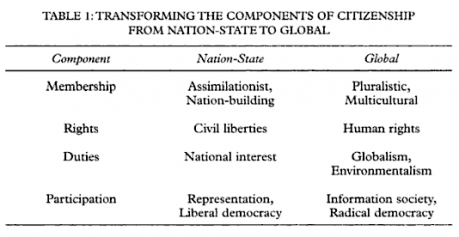Globalization

Our world has suddenly become a much smaller place. Through increased technology, the spread of communication and transportation, and the extension of trade, we suddenly have access to more of the world than ever. This change is known as globalization. According to the United Nations, there are both pros and cons to globalization:
(+) benefits consumers and efficient producers
(-) harms less competitive producers
(-) limits the freedom of governments to create barriers and import policies
(+) improves access of countries to large markets and variety of products and technological progresses
(+) greater efficiency, more investment, hight outputs and better standards of living for some
(-) distribution is not generally evenly distributed within and between countries
(+)increases export
(-) increases import
(adapted from United Nations ESCWA Report, 2002)
In general, globalization has had some positive effects, but most of them have mostly benefited the upper and middle class of the first world, leaving the rest of the world to do the “dirty work” of factory, field, chemical, assembly, and textile labour that we don’t see. Globalization has created a false sense of connection- we can travel to Cancun, watch movies about South Africa, eat bananas from Peru, listen to an mp3 player made in China, and drive a car from Japan. However, we never really meet the people, the culture, or the issues that are behind the products. For example, even though Mexico is Canada’s third largest trading partner in imports, how often to do we hear about the loss of land, displacement of peoples, abuse of power, and struggle for rights and fair wages that is currently going on due to the industrial and agricultural sectors in Mexico?
The greater this separation becomes, the greater the issues will become.
(+) benefits consumers and efficient producers
(-) harms less competitive producers
(-) limits the freedom of governments to create barriers and import policies
(+) improves access of countries to large markets and variety of products and technological progresses
(+) greater efficiency, more investment, hight outputs and better standards of living for some
(-) distribution is not generally evenly distributed within and between countries
(+)increases export
(-) increases import
(adapted from United Nations ESCWA Report, 2002)
In general, globalization has had some positive effects, but most of them have mostly benefited the upper and middle class of the first world, leaving the rest of the world to do the “dirty work” of factory, field, chemical, assembly, and textile labour that we don’t see. Globalization has created a false sense of connection- we can travel to Cancun, watch movies about South Africa, eat bananas from Peru, listen to an mp3 player made in China, and drive a car from Japan. However, we never really meet the people, the culture, or the issues that are behind the products. For example, even though Mexico is Canada’s third largest trading partner in imports, how often to do we hear about the loss of land, displacement of peoples, abuse of power, and struggle for rights and fair wages that is currently going on due to the industrial and agricultural sectors in Mexico?
The greater this separation becomes, the greater the issues will become.
Global Citizenship

According to Darren J O’Byrne in his book The Dimensions of Global Citizenship, there are four components to the generally accepted definition of citizenship, which include “membership, concerning inclusion and exclusion; rights and duties in reciprocity; and participation in the political sphere” (211). As globalization increases and we become a part of a larger global society, our current local nation-state citizenship is no longer able to address the wider-spread issues that we are responsible to. O’Byrne comments, “...with the suggestion that definitions of citizenship as they currently stand are insufficient to help us deal with the problems of the contemporary world, I turned my attention towards identifying a new form of citizenship based around an unmediated relationship between individual and globe” (212). This unmediated relationship is global citizenship, and it is the idea that we as human beings are not only citizens of our respective countries, but also citizens of the larger globe. We are interconnected with the rest of our world through communications, media, environment, and trade, each of us affecting others simply by the way we live our everyday lives. O’Byrne provides a table that shows the necessary shift from viewing ourselves as nation-state citizens to global citizens:
Acknowledging our opportunity, responsibility even, to be citizens of not only our nations, but also of the globe, is a key first step to understanding and acting to create change in our world today. The effects of this are far reaching, but also return full circle to us at home.

